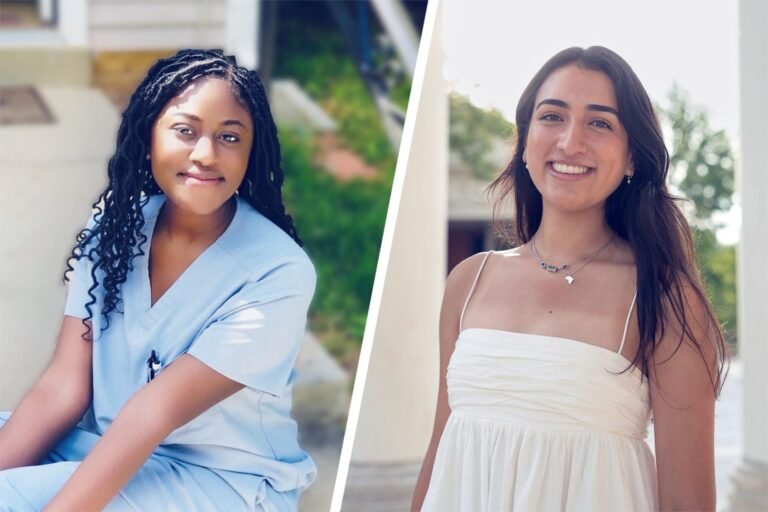Magdalene Kwarteng
Kwateng plans to become a doctor who will address social disparities and the needs of disadvantaged communities locally and globally. With the Rotary scholarship, she will pursue a master’s in public health at the University of Sydney School of Public Health in Australia.
“The Master’s in Public Health will help me bridge the knowledge gap between individual clinical care and the broader local and global community,” Kwateng says. “I will be better equipped to develop community-based interventions to address mental health stigma and promote mental health on a larger scale.”
Kwarteng chose the University of Sydney because of its “commitment to equity and community improvement through locally led initiatives”.
“Learning about other countries’ health care systems has been extremely eye-opening and can lead to insights on how we can improve the U.S. health care system,” she said. “Taking what I’ve learned internationally not only helps the patients I see in the U.S., but also helps me connect with patients from all walks of life and cultures.”
Kwateng’s family is originally from Ghana and lived in Verona, Italy before moving to Northern Virginia.
“Growing up in a primarily immigrant, medically underserved area of Alexandria, I was shocked to see such disparities exist in a seemingly affluent county,” she said, noting that while Alexandria has a high median income, about 11 percent of the population is uninsured. “I saw firsthand the health care challenges and barriers these communities faced, and my experiences inspired me to go into the health care field to improve health care access and equity locally and globally.”
After earning her master’s degree, Kwateng plans to complete her final year of medical school at the University of Virginia, then complete her psychiatry residency, which will include a child and adolescent specialty and/or maternal mental health fellowship.
“I want to become a holistic psychiatrist who can help inspire positive change in the field of mental health,” she says. “A master’s in public health will help me achieve that goal.”
Kwateng has conducted global health research in Rwanda as a researcher at the University of Virginia’s Center for Global Health Equity and has also volunteered at the University Medical Association Clinic in Charlottesville.
“These opportunities have only made me more motivated to become a physician who not only provides excellent individualized care but also works to address disparities on a larger scale,” she said.
Hannah Zaberi
Zaveri will graduate with a degree in International Public Health and Sociology in 2023 and go on to complete a Masters of Science in Public Health from the London School of Hygiene and Tropical Medicine.
“I look forward to better understanding the risks that climate change poses to vulnerable populations and advocating for important climate and health policy changes,” she said.
Born in Kenya, Zaveri has worked in Rwanda and considers East Africa home, but she first saw the importance of access to healthcare while growing up in Zimbabwe.
“In secondary school, I witnessed the severe healthcare disparities in Harare while volunteering with Chieda, an organisation that provides education and meals to vulnerable children affected by HIV/AIDS,” says Zaveri. “Working with Chieda sparked my interest in studying public health to improve healthcare in South Africa.”
Zaveri, of Falls Church, appreciates Rotary International’s interest in access to health care.
“Its focus on sustainable disease prevention and treatment aligns with my career interests,” she said. “Throughout the application process, I thought about and clearly explained why a Masters in Public Health from the London School of Hygiene and Tropical Medicine would help me achieve my goals and make the biggest positive impact.”
Her degree will culminate with a master’s project report focusing on elements of climate change.
“I’m interested in investigating the disproportionate impact of climate change on the spread of malaria and other diseases,” Zaveri said. “I want to highlight the reality that low-income communities are the most vulnerable to the adverse health effects of flooding, extreme temperatures and pollution.”
An Echols Scholar during her undergraduate years, Zaveri conducted research with the PositiveLinks research team at the University of Virginia’s Ryan White HIV Clinic, was a member of the Peer Health Educators leadership team, volunteered at University of Virginia Health Children’s and served on the University of Virginia Habitat for Humanity board of directors.
“Being involved with the University of Virginia and the Charlottesville community was a huge part of my undergraduate experience,” Zaveri said.
Assistant Professor Katherine Quissell, director of the Global Public Health Program, taught Zaveri three courses, including her graduate project.


